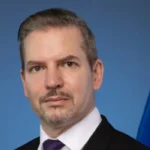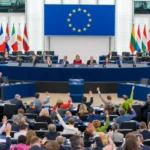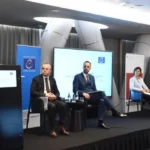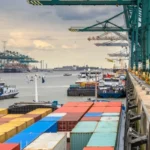The “sanitary cordon” which isolates far-right political groups in the European Parliament is clearly not obvious to everyone. The German Marie-Agnes Strack-Zimmermann, 65 years old, member of the liberal FDP, anxious to ensure her election, this Tuesday, July 23, as president of the “security and defense” subcommittee, sent Sunday evening to the 30 MPs who are members, an e-mail, written in the recipient’s language, asking them to support it. So far nothing shocking. Except that she also sent it to the four deputies of the “Patriots for Europe”, the group of Jordan Bardella, including the Frenchman Pierre-Romain Thionnet, former parliamentary assistant to the president of the RN and boss of the RNJ (the organization youth of the RN), and to the sole representative of “the Europe of sovereign nations”, a German from the Alternativ für Deutschland (AfD), Hans Neuhoff. In his enthusiasm, RN Mathieu Valet (former boss of the Independent Union of Police Commissioners) also received it even though he is not a member of this subcommittee. Emotion, to put it mildly, within Parliament.
What is even more difficult is that the FDP belongs to the Renew group chaired by Frenchwoman Valérie Hayer, who was the head of the Renaissance list in the European elections. At the group’s leadership, we plead the error of “youth”, this one having just been elected. But, in the Bundestag, of which she was a member from 2017 to 2024, there is also a cordon santé around the AfD to which she nevertheless addressed her email, which makes the explanation a little short.
“Youthful mistake”
It remains to be seen whether this “youthful mistake” will cost him his presidency, which would not displease the conservatives of the EPP, but also the French delegation of Renew. Indeed, the conservatives, the largest political group by far in the Assembly, want to make the FDP (5 elected officials, plus 3 of the Freie Wähler) pay for its opposition to the reappointment of the German Ursula von der Leyen, also a member of the PPE, as President of the Commission during the vote of confidence on July 18. Indeed, the three groups forming the majority (besides the EPP, the Socialists and Renew) had agreed on the distribution of the Union’s “top jobs”, the presidency of the European Council of Heads of State and of government going to a socialist (the Portuguese Antonio Costa) and the direction of European diplomacy to the Estonian liberal Kaja Kallas. The FDP’s refusal to implement this agreement is all the more strange as it governs in Berlin with the socialists and ecologists who voted without qualms for Ursula von der Leyen.
The EPP also knows that many in Renew, including the French, do not want an FDP, totally opposed to European defense financed by community funds, at the head of this subcommittee hitherto chaired by the Frenchwoman Nathalie Loiseau (Together). If this could not be renewed, it is because of the costly choice of Paris to retain the presidency of the Renew group: in fact, as the French delegation was divided by two, it could no longer claim the presidency of the parliamentary committees (it had three, including that of the environment, in the previous legislature).
Secret ballot
But breaking the deal concluded between the three majority groups on the distribution of positions of power within Parliament is never easy. The EPP therefore surveyed Renew to find out if it would agree to request a secret ballot in order to fire Zimmermann, with no one knowing who would be responsible for his fall… Sensing Jarnac’s blow coming, Zimmermann and the FDP therefore panicked and requested all possible support, even beyond the cordon santé. At a minimum, a lack of professionalism from the FDP.
If Zimmermann is nevertheless elected, the EPP still has the means to transform his presidency into a nightmare: the defense subcommittee must in fact be transformed at the start of the school year into a full-function committee, which will imply that committees chaired by conservatives give up some of their skills. Suffice it to say that there is little chance of this happening. And this at the worst time, the Union having decided to build a European defense industry in order to be able to produce enough weapons to face Russia. From small politics to big ones.






